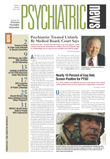A major depression can take an enormous toll on the mental function, physical function, work capability, social life, and overall life satisfaction of people who are severely, chronically depressed, a large new study implies.
The lead investigator was Madhukar Trivedi, M.D., a professor of psychiatry at the University of Texas Southwestern Medical Center in Dallas. Results appeared in the February Journal of Clinical Psychiatry.
“The findings are very interesting,” Trivedi told Psychiatric News, “because we studied patients' health-related quality of life in multiple domains and found them all to be negatively affected by the illness. Moreover, the dysfunction seen in multiple domains was over and above the mere impact of age and symptom severity....”
In other words, even when depression severity and age were taken into consideration, a number of clinical features and sociodemographic factors were linked with quality of life.
Some of the links might be expected. For example, depressed subjects without a job reported overall lower life satisfaction than employed depressed subjects. Depressed subjects with medical illnesses reported poorer physical function than depressed subjects without such illnesses.
Some of the links, however, might be surprising.
For instance, while one might expect that depressed subjects with private medical insurance would report better physical function than those with public insurance or no insurance, curiously subjects with no health insurance reported better physical function than those with public coverage. A possible explanation, Trivedi and his colleagues wrote, is that “patients who perceive themselves to be in better health may be less motivated to purchase private health insurance or to pursue public insurance.”
Also of note, depressed subjects with a college degree reported better physical function compared with depressed subjects with less education—something one might anticipate. But depressed subjects with less education reported better mental function than depressed subjects with a college degree. A possible explanation, Trivedi and his group suggested, is that “patients with higher levels of education are more cognizant of the limitations that depression imposes upon them. In addition, it is possible that greater educational attainment is associated with a more complex and stressful lifestyle or with jobs that require greater cognitive capacity that, in turn, decreases quality of life.”
The study's take-home message for clinical psychiatrists, Trivedi said, is“ that we should not only be routinely measuring symptoms, but also doing a reasonably thorough job of assessing the functional impact of major depressive disorder. This, I believe, will be even more important when we go about assessing treatment effects.”
The study, which was funded by the National Institutes of Health, was based on questionnaire data collected from some 1,400 subjects when they enrolled in the Sequenced Treatment Alternatives to Relieve Depression (STAR*D) clinical trial. The STAR*D trial, conducted at 41 primary or specialty care sites throughout the United States, was designed to assess which of several treatments are most effective for major depression outpatients who are dissatisfied with their initial treatment. Furthermore, the subjects had been suffering with their current major depression for, on average, two years and had been experiencing major depressions for, on average, 16 years.
Yet another study based on data collected from the subjects when they enrolled in the STAR*D clinical trial showed that subjects with public health insurance or no health insurance had significantly worse depression and more suicide attempts than did subjects with private health insurance (Psychiatric News, September 16, 2005). The results of the first phase of STAR*D were reported in the January 20 issue.
“Factors Associated With Health-Related Quality of Life Among Outpatients With Major Depressive Disorder: A STAR*D Report” is posted at<www.psychiatrist.com/privatepdf/2006/v67n02/v67n0203.pdf>.▪
